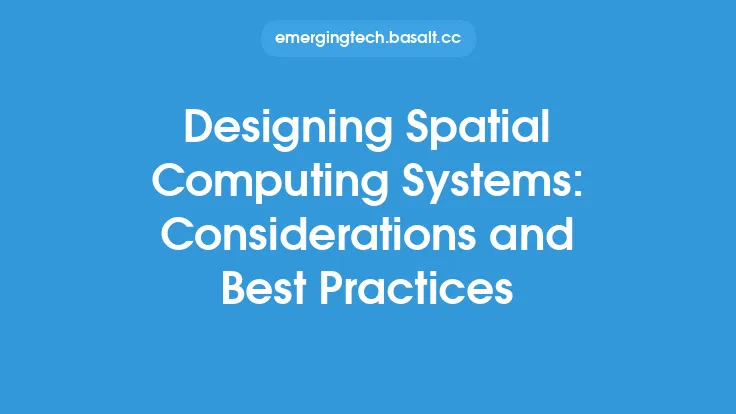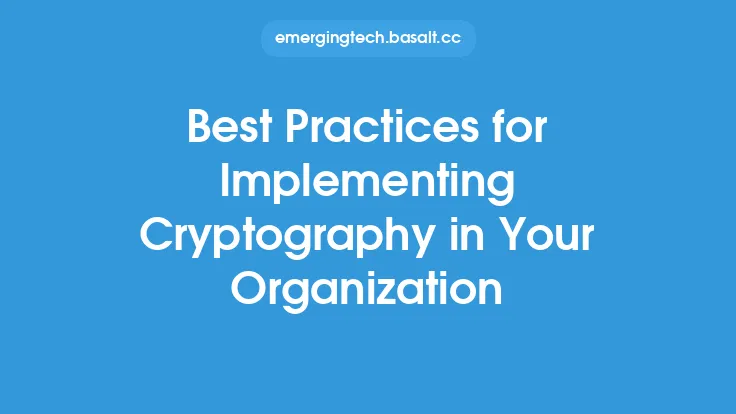Implementing quantum algorithms is a complex task that requires careful consideration of several factors, including the choice of quantum programming language, the design of the algorithm, and the optimization of the code for a specific quantum hardware platform. In this article, we will discuss the best practices and considerations for implementing quantum algorithms, with a focus on the technical aspects of quantum algorithm implementation.
Introduction to Quantum Algorithm Implementation
Quantum algorithm implementation involves translating a quantum algorithm into a set of instructions that can be executed on a quantum computer. This process requires a deep understanding of quantum mechanics, linear algebra, and programming concepts. Quantum algorithms are typically described using a high-level programming language, such as Q# or Qiskit, which provides a set of primitives for manipulating quantum bits (qubits) and performing quantum operations.
Choosing a Quantum Programming Language
The choice of quantum programming language is a critical factor in quantum algorithm implementation. Different languages have different strengths and weaknesses, and the choice of language will depend on the specific requirements of the algorithm and the hardware platform. For example, Q# is a high-level language developed by Microsoft that provides a simple and intuitive syntax for describing quantum algorithms. Qiskit, on the other hand, is an open-source language developed by IBM that provides a more comprehensive set of tools and libraries for quantum algorithm development.
Designing Efficient Quantum Algorithms
Designing efficient quantum algorithms requires a deep understanding of quantum mechanics and the specific problem being solved. Quantum algorithms typically involve a series of quantum operations, such as rotations, entanglements, and measurements, which are applied to a set of qubits. The goal of the algorithm is to manipulate the qubits in such a way that the solution to the problem is encoded in the final state of the qubits. Efficient quantum algorithms are those that minimize the number of quantum operations required to solve the problem, while also minimizing the amount of quantum error correction required.
Optimizing Quantum Code for Hardware
Once a quantum algorithm has been designed, it must be optimized for a specific quantum hardware platform. This involves translating the high-level code into a set of low-level instructions that can be executed on the hardware. The optimization process typically involves minimizing the number of quantum operations, reducing the amount of quantum error correction required, and optimizing the use of quantum resources such as qubits and quantum gates.
Quantum Error Correction and Noise Reduction
Quantum error correction and noise reduction are critical components of quantum algorithm implementation. Quantum computers are prone to errors due to the noisy nature of quantum systems, and these errors can quickly accumulate and destroy the fragile quantum states required for quantum computation. Quantum error correction involves adding redundancy to the quantum code to detect and correct errors, while noise reduction involves minimizing the amount of noise in the system through techniques such as error mitigation and noise filtering.
Quantum Circuit Synthesis and Optimization
Quantum circuit synthesis and optimization involve translating a high-level quantum algorithm into a set of low-level quantum gates that can be executed on a quantum computer. This process typically involves minimizing the number of quantum gates required, reducing the depth of the circuit, and optimizing the use of quantum resources such as qubits and quantum gates. Quantum circuit synthesis and optimization are critical components of quantum algorithm implementation, as they can significantly impact the performance and efficiency of the algorithm.
Testing and Validation of Quantum Algorithms
Testing and validation of quantum algorithms are critical components of quantum algorithm implementation. Quantum algorithms are typically tested using a combination of analytical and numerical methods, including simulation, emulation, and experimentation. The goal of testing and validation is to verify that the algorithm is correct, efficient, and robust, and to identify any errors or bugs that may be present in the code.
Best Practices for Quantum Algorithm Implementation
Best practices for quantum algorithm implementation include using a high-level programming language, designing efficient quantum algorithms, optimizing quantum code for hardware, implementing quantum error correction and noise reduction, using quantum circuit synthesis and optimization techniques, and testing and validating the algorithm thoroughly. Additionally, it is essential to stay up-to-date with the latest developments in quantum algorithm implementation, including new programming languages, tools, and techniques.
Future Directions for Quantum Algorithm Implementation
The field of quantum algorithm implementation is rapidly evolving, with new developments and advancements being made regularly. Future directions for quantum algorithm implementation include the development of new programming languages and tools, the improvement of quantum error correction and noise reduction techniques, and the exploration of new applications and use cases for quantum algorithms. As the field continues to evolve, it is essential to stay informed and adapt to the latest developments and advancements.
Conclusion
Implementing quantum algorithms is a complex task that requires careful consideration of several factors, including the choice of quantum programming language, the design of the algorithm, and the optimization of the code for a specific quantum hardware platform. By following best practices and staying up-to-date with the latest developments in the field, developers can create efficient, robust, and scalable quantum algorithms that can be used to solve real-world problems. As the field of quantum computing continues to evolve, the importance of quantum algorithm implementation will only continue to grow, and it is essential to be prepared for the challenges and opportunities that lie ahead.





